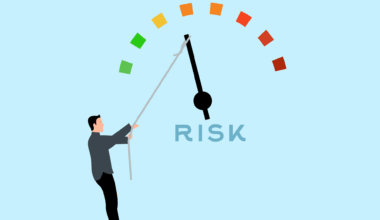Addressing Behavioral Biases in Entrepreneurial Decision-Making
Entrepreneurs frequently encounter challenges stemming from behavioral biases that can hinder effective decision-making. Understanding these biases is crucial for their success. One common bias is confirmation bias, where individuals favor information that confirms their preexisting beliefs. This can lead to poor decision-making, as critical insights are overlooked. To combat this, entrepreneurs should actively seek diverse perspectives and alternative viewpoints. Another prevalent issue is overconfidence bias, where entrepreneurs overestimate their knowledge or abilities. This can skew their risk assessment and lead to reckless decisions. Developing a practice of regular self-reflection can help ground their confidence. Emotional biases, such as loss aversion, can also cloud decision-making. This occurs when the fear of losses disproportionately impacts choices. Entrepreneurs can overcome this bias by focusing on potential gains rather than losses. By employing strategies like scenario planning, they can better visualize outcomes. Furthermore, consultation with advisors or mentors can provide valuable insights. Such collaborations offer an outside perspective that can counteract personal biases. In conclusion, awareness and proactive strategies are essential for overcoming behavioral biases in entrepreneurship.
To further improve decision-making, entrepreneurs can harness the power of structured decision-making frameworks. These frameworks provide a systematic approach to analyze options, making it easier to identify biases impacting their decisions. Techniques such as decision trees and cost-benefit analyses enable entrepreneurs to visualize potential outcomes objectively. Additionally, conducting pre-mortem analyses can be beneficial, as it encourages teams to consider possible failure scenarios before making decisions. This proactive approach allows for the identification of biases that may be influencing predictions. Entrepreneurial teams should foster an open culture that encourages the challenge of assumptions and embraces constructive dissent. This can build a healthier decision-making environment where biases are more easily identified and addressed. Another powerful strategy involves leveraging technology to track and analyze decision outcomes. Data analytics can reveal patterns and trends in past decisions, highlighting areas where biases may have influenced results. Regularly reviewing these outcomes provides opportunities for learning and growth, reinforcing self-awareness among entrepreneurs. Engaging in continuous education about behavioral finance is also paramount, allowing entrepreneurs to remain informed about biases and mitigation strategies. By implementing a combination of these approaches, entrepreneurs can significantly enhance their decision-making processes.
Implementing Behavioral Awareness Techniques
Developing behavioral awareness techniques is essential for entrepreneurs seeking to mitigate biases. Mindfulness practices can significantly enhance self-awareness by encouraging individuals to observe their thoughts and feelings without judgment. By incorporating mindfulness into daily routines, entrepreneurs can gain better insights into their decision-making processes. This increased awareness helps in recognizing when biases may be influencing choices. Additionally, journaling can serve as an effective tool for reflection and analysis. Maintaining a decision journal where entrepreneurs record their thought processes, outcomes, and emotional reactions allows for valuable reflection later. This practice encourages critical examination of past decisions, fostering better future choices. Collaborating with a diverse team can also counteract individual biases, facilitating a mix of perspectives that provide a more accurate view of potential decisions. Creating a culture that values feedback and honest discussion helps all team members to openly address biases. Furthermore, utilizing checklists when making critical decisions can assist in ensuring that all relevant factors are considered, minimizing the influence of biases. These behavioral awareness techniques empower entrepreneurs to make informed, strategic decisions in complex business environments.
Entrepreneurs should also focus on developing a growth mindset to effectively address their biases. Embracing a growth mindset encourages openness to learning and adaptability, which are essential in dynamic environments. This approach aids in recognizing that failure is not a definitive end but a learning opportunity. By fostering resilience, entrepreneurs can approach setbacks with a more constructive attitude. Building confidence while maintaining humility creates the perfect balance for effective decision-making. Seeking constructive feedback from advisors or networks enhances this learning process and provides valuable insights. Establishing a regular feedback loop not only boosts knowledge but also instills accountability, ensuring entrepreneurs stay attuned to their cognitive biases. Analyzing past decisions and their outcomes is also critical; this reflective practice can illuminate recurring biases that impact performance. Entrepreneurs can mitigate these challenges by recognizing patterns and adjusting their approaches accordingly. Networking with other entrepreneurs to share experiences facilitates collective learning and can reveal common biases encountered. Creating a support system offers emotional stability during turbulent times, ensuring entrepreneurs maintain clarity and focus in their decisions.
Leveraging External Advisors
Engaging with external advisors or coaches is an effective strategy for mitigating behavioral biases. These professionals offer fresh perspectives that challenge an entrepreneur’s thought process and can highlight blind spots that may go unnoticed. A trusted advisor can act as a sounding board, enabling entrepreneurs to explore alternative viewpoints and potential solutions. This relationship fosters an environment conducive to critical thought and deliberation, counteracting tendencies toward impulsive decisions. Additionally, external advisors can provide valuable insights based on their experiences with similar challenges, offering practical strategies for navigating complex scenarios. Collaborating with mentors who have expertise in behavioral finance can also enhance an entrepreneur’s understanding of common biases. Workshops or training sessions focused on behavioral finance can further deepen this knowledge. By continuously learning about behavioral strategies, entrepreneurs are better equipped to identify when biases arise. A structured consulting partnership not only helps in recognizing biases but also enables entrepreneurs to apply techniques effectively. Therefore, it’s crucial for businesses to prioritize relationship-building with mentors and advisors as part of their ongoing professional development efforts.
Moreover, creating a culture of evidence-based decision-making is pivotal for addressing biases within organizations. Encouraging teams to rely on data and analytical tools minimizes the emotional aspects of decision-making. This reliance promotes objectivity and helps in making informed decisions over instinctive reactions. Equipping teams with the skills to analyze data fosters a more analytical mindset that questions biases more effectively. Regular training sessions on data analysis and critical thinking can empower team members to challenge assumptions. Additionally, instituting cross-functional teams can bring diverse skills and insights into discussions, further combating biases. Engaging in scenario planning with varied stakeholders ensures multiple perspectives are considered and potential biases challenged. Encouragement of transparent communication is essential to facilitate open discussions about biases and their impact on decisions. Establishing clear guidelines for decision-making processes can serve as a valuable reference point when biases arise. Encouraging team members to document their thoughts throughout decision-making can also minimize the influence of biases on final outcomes. This structured approach provides a framework for rigorous evaluation, enabling better decision quality overall.
Fostering Continuous Improvement
Finally, fostering a culture of continuous improvement within entrepreneurial ventures contributes to overcoming behavioral biases. Regular review sessions where teams discuss previous decisions and their outcomes allow for critical reflection and learning opportunities. By identifying what worked and what didn’t, entrepreneurs and their teams build a repository of experience that informs future decisions. Implementing after-action reviews encourages a proactive approach to learning from both successes and failures. This practice cultivates an environment where biases are openly discussed and challenged, promoting collective responsibility in decision-making processes. Establishing metrics for assessing decision impacts enables teams to measure the effectiveness of their strategies objectively. Sharing insights from both successful and unsuccessful decisions fosters transparency and builds trust within teams. Moreover, regularly revisiting goals and adapting strategies to align with changing market conditions emphasizes agility. A continuous improvement mindset also highlights the importance of experimenting with new techniques to better address biases. Embracing innovative tools and approaches aids in continually refining decision-making processes. Thus, engaging in this cycle of evaluation fosters a more resilient entrepreneurial framework.
In conclusion, addressing behavioral biases in entrepreneurial decision-making is essential to enhance effectiveness and maintain competitiveness. By employing structured methodologies, fostering a culture of openness, and learning from past experiences, entrepreneurs can significantly mitigate the impact of biases on their choices. It is crucial to acknowledge that decision-making is inherently subjective and influenced by various psychological factors, demanding awareness and proactive strategies. Entrepreneurs should recognize their biases and actively seek to counteract them through intentional practices like mindfulness, feedback loops, and collaborative discussions. Building a strong support network of advisors and mentors who understand these challenges can provide invaluable insights, further equipping entrepreneurs to navigate complex environments. As this journey unfolds, entrepreneurs will discover that enhancing decision-making is an iterative process that requires diligence, reflection, and continuous learning. Ultimately, by committing to personal and professional growth, entrepreneurs can improve their decision-making capabilities and foster success in their ventures. The impact of overcoming biases will not only benefit individual entrepreneurs but also create a more robust business ecosystem overall, where data-driven and thoughtful decisions thrive.





